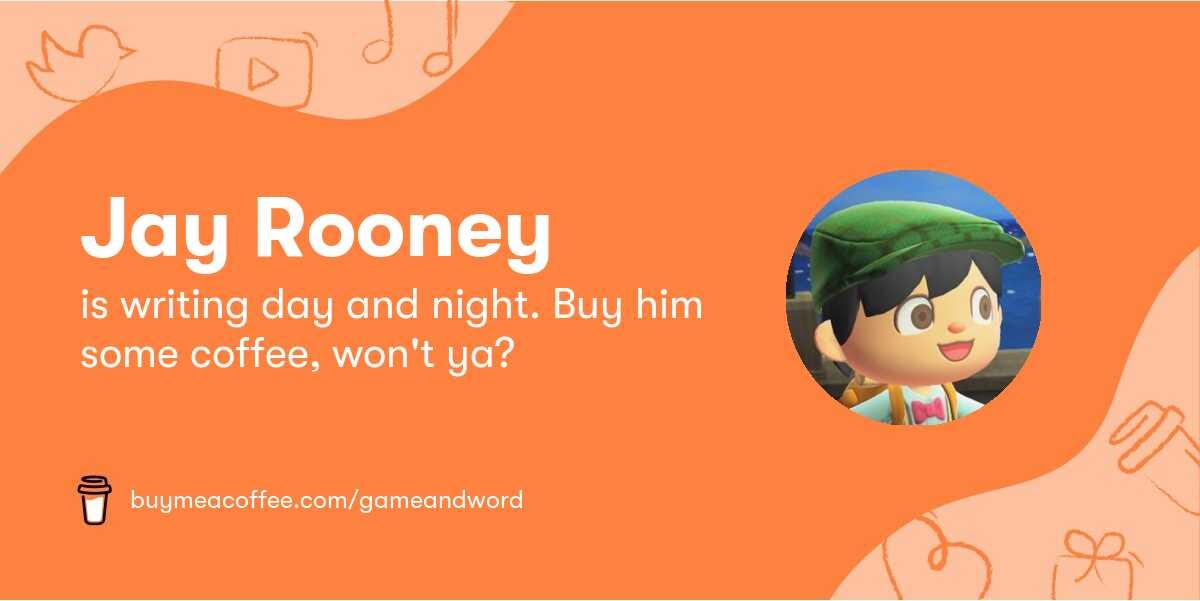⚠️💬📢 PLEASE NOTE 📢💬⚠️
This is an early access podcast episode; paid subscribers can listen to it right away, and anyone can listen to it two weeks after the publication date. So this episode will open up on June 1, 2022. If you want to listen to it sooner, upgrade your subscription today.
Table of Contents
Introduction
Podcast References
Transcript
Footnotes
Introduction
Hello, psychonauts!
This week, I sit down with Jared Hansen, author of The Symbolism of Zelda: A Textual Analysis of Majora’s Mask (the same book I’ve listed under “Further Reading” throughout this volume), to talk about Zelda, symbolism, and game scholarship.
If I sound a little tired or weird, apologies in advance. I actually had to re-record this episode (and a few others), because apparently, nobody’s figured out how to make a user-friendly, reasonably priced, and powerful stable decent functional screen recording tool yet... 😞 So I might sound a little out of it, mostly because I was a little out of it.
(Relatedly, this is also why I’m delivering this to you today instead of last week as scheduled.)
Still, I hope you enjoy the conversation! As usual, you can find this episode’s podcast references, footnotes, and full transcript below.
See you next week!
~Jay
PS—If you need a refresher on Majora’s Mask before diving in, here are the relevant articles:
A Quick Note for Our Listeners
Starting with this episode, comments on all future Game & Word Podcast episodes are only available to paid subscribers. This particular episode is also early access, which means paid subscribers can listen to it two weeks before I unlock it to the public.
Not paid? Want in on these perks? There’s an easy fix for that… ⬇️⬇️⬇️
PS—If you enjoy the newsletter, but aren’t ready to commit to a paid subscription, consider buying me a cup of coffee. Just $5 will fuel one full night of writing. Just click the image below ☕️:
Podcast References
Books
The Symbolism of Zelda: A Textual Analysis of Majora’s Mask by Jared Hansen
The Symbolism of Zelda: A Textual Analysis of The Wind Waker by Jared Hansen
Games
The Legend of Zelda [Official Site]
Extras
Transcript
NOTE: This transcript has been lightly edited for clarity.
Game & Word: Good afternoon, everyone, and welcome to another bonus audio edition of Game & Word. Here, with me today, I have Jared Hansen: a Ph.D. candidate at the University of Oregon and author of [The Symbolism of Zelda: A Textual Analysis of Majora’s Mask],1 one of the sources for our recent two-parter on Majora's Mask. Thank you, Jared, for joining me today.
Anything you want to tell my listeners that I haven't covered?
Jared Hansen: Sure. Like you said, I'm a Ph.D. candidate. I've been writing my dissertation on video games. And I've got two Zelda books out. You mentioned one of them, the other one is on The Wind Waker.
And I'm excited to join you on this podcast to talk about it.
Game & Word: Yeah, thanks for coming on! Tell us a bit about your dissertation. What are you writing it on?
Jared Hansen: I'm really fascinated with video game nostalgia in all of its forms. And so I'm actually studying a community of players who are playing an older video game, Star Wars Galaxies, and analyzing why they're keeping this RPG running.
Since the official servers shut down in 2011, they've been hosting their own private server since then. Because they don't want this experience to die. And it's just been really fascinating to be with these players in a game that's very dated as far as graphics go, but it's still fun and they love it.
Game & Word: And how did you come to start studying video games in an academic setting?
Jared Hansen: In my master's program, I was trying really hard to find a topic. And it was actually Zelda that got me inspired, because I was reading some academic literature on other things, and tried to find what's been written about Zelda. Which is one of my favorite series in video games. I found out no one was really writing about it, so I was like, “Hey, I can make my stamp. I can fill this hole." And that's when I started my master's thesis on Zelda.
And now, my dissertation is a different topic, but [I’m] still studying video games.
Game & Word: So about your books. As we just mentioned, you have two out so far: one on Majora's Mask and one on Wind Waker. What made you choose those two games in particular?
Jared Hansen: These games, along with Ocarina of Time, represent my “peak” involvement, I guess you could say, in Zelda. That's when I was a kid growing up with them, and those are the three games that really resonated with me during that formative time.
I think with a lot of people, that's how Zelda is for them. Their favorite game is the game that they played the most as a kid.
Game & Word: And what really resonated with you?
Jared Hansen: As a kid, I think it was the action-adventure genre. Because it's very engaging. It involves some skill, but it's still a skill that you can master, even at that age. As opposed to something like a racing game which takes a lot more hand-eye coordination, or RPGs which sometimes aren't quite as interactive.
And so, I really loved these games for that sense of adventure. And at the same time, that sense of accomplishment, when you complete a dungeon. It's fun and rewarding.
Game & Word: Absolutely. And how about in terms of the narrative or themes?
Jared Hansen: There's a joke about the Zelda formula, as far as [gameplay] goes, but it also applies to their storylines. Eventually, the series is almost like a fairytale that just keeps getting repeated over the generations.
But for me, it's almost comforting. To know that at the end of the day, there's going to be a Princess Zelda. There's going to be a hero Link and there's going to be a villain Ganon or Ganondorf.
And, yeah, I wouldn't mind if they swap out some villains occasionally, that's fine too. But just as long as we have some recurring myths, tales, and stories that you can rely on and come back to.
Game & Word: Yeah. That does make Majora's Mask an interesting case because It's just so different than any of the other Zelda games, in so many ways. It's even up there with Breath of the Wild, just as far as how different it is while still being recognizably Zelda.
I'm curious to know your thoughts as to your first time playing it. And how your reaction to it was.
Jared Hansen: Yeah. It had a lot of hype when I was a kid, just because the three-day mechanic was so revolutionary. I know there are a lot of people, myself included, I was like, “how can you finish a game in three days?” It just didn't make any sense.
But obviously, after playing it, it's "oh, it's just a matter of rewinding time over and over." And so that mechanic weaves itself into the narrative, and it's just fun. I guess at a subconscious level, it's similar to playing any video game, really.
The whole concept of video game lives, of game overs? Just this idea of, "okay, let's restart, let's reset, let's wind things back and try it again a second time." And that's something that you find in all kinds of video games. I think it's a universal experience that we all enjoy and love.
And Majora's Mask, on the other hand, just puts that in the forefront and reminds you, "Hey, you have this ticking clock, and if you don't get everything done, then it's going to be undone."
That was a little frustrating, but also rewarding, as a kid. And even now, it's fun knowing that throughout the game, my back is up against the wall.
Game & Word: And of course mechanically, it's very different. And in a way that really, really holds up remarkably well, I would add. And thematically, very different, too. Much darker and somber and kind of mature in a way.
What do you think are the main themes that Majora's Mask explores?
Jared Hansen: I know a lot of people talk about how it's an exploration of grief. And I definitely feel that way, but I also feel like it's just an examination of the human condition, in a lot of ways. It just brings that to the forefront—of how you have all these different characters that you meet who are suffering in different ways.
But at the same time, Link is, too. He's trapped in Termina and he's trying so hard to get out and save the day, he doesn't want to be here! He wants to find Hyrule again. And so I think thematically, it really touches on a lot of mature themes, like you said, of loss and sorrow.
And the atmosphere just hangs there and feels… like you said, somber.
Game & Word: Yeah. Another different thing about Majora's Mask was how they took the whole concept of wearing masks and made it so central to the game, thematically. So, as someone who studies symbolism, trying to get at deeper meanings behind what we see on the screen, what do you make of the game's spotlighting of masks?
Jared Hansen: I think from a gameplay mechanic, It's great. And it's almost like a collectible—each one has their own unique ability. You want to go out and find them so you can power up and level up.
But also from a thematic point of view and the symbolism behind it, playing pretend is a common form of play. So when we wear mask,s it's a chance to explore a different personality or a different experience. And to pretend and imagine a different reality.
Whether it's the person wearing the mask or the people observing you wearing a mask; they also have to pretend that, "oh, they are not what they appear, they are this mask." And so I think a lot of the symbolism comes out when you think about, “what are some masks that we may wear?” Invisible ones, masks to hide our pain, or things like that.
Game & Word: And I wonder, as well, if there's some kind of deeper symbolic meaning of the fact that masks feature so prominently in the lore of Termina. Like how they have this entire festival, right? Where people wear masks and party. And the fact that masks feature so prominently in wedding rituals, for example. This is a world in which masks are very central. What does that say about the world, and the culture of the people within it?
Jared Hansen: If we're to try and draw parallels between the culture of Termina and ours, [as Americans] our culture relegates masks to events such as Halloween or Mardi Gras; these sorts of experiences of adventure, play, those sorts of things.
Whereas in Termina, yes, they have their mask festival, which could be akin to Halloween for us. But at the same time, like you said, they also wear masks at weddings and other things. And so it's interesting to think about how, to them, masks can also be symbolic of other rituals, other practices of how we transcend from ourselves and do something different and better.
Game & Word: As far as individual masks are concerned—and I know this is a tough question, so top three is fine—which of the masks more personally resonated with you?
Jared Hansen: Gosh, that's a hard question. I know it shouldn't be, but it is!
I definitely loved the Bunny Hood, just for the experience. It's really fun to go really fast and jump really high.
The Couple's Mask, just because that's, I guess you could say, the peak of the game. You have to go through all of these different experiences, perfectly coordinated, so that you can eventually finish that storyline and receive that reward. And so that's a lot of fun.
And I guess my third mask… I might just have to say the Zora's Mask. Because it's fun to transform into that animal, but also the powers that you receive, and the fact that when you play your instrument, it's a skeleton fish/skeleton guitar. That's pretty awesome.
Game & Word: Totally. The Zora Mask is definitely up there for me. Besides that, I would say, the Garo Mask and the All-Night Mask, too. There's something so strangely, delightfully creepy about it.
Jared Hansen: Why am I forgetting the name of it, the cow mask so that you can enter the milk bar?
Game & Word: Romani’s Mask.
Jared Hansen: That is just so peak Zelda to me. "Let's make an adult joke about alcohol and bars, but we'll make it kid-friendly. So now you can't go and drink your milk unless you're older.” That's just so hilarious to me.
Game & Word: Totally. This is a hard question, because it's so personal, so subjective. But if any of our listeners have been reading these articles, then listen to this podcast and thinks, "Oh, you know, I really should get around to playing a Zelda game." Where would you recommend they start?
Jared Hansen: Personally, I would pick whatever Zelda game is most accessible to you. If you can go out to the store and buy a Zelda game on the shelf, play that. If you have a friend who lends their copy of A Link to the Past, play that. Just because I feel like you'll have a good experience regardless.
[That said], if you play Breath of the Wild, it's a completely different game. And so I think it would be hard for someone to enjoy that open-world exploration, and then all of a sudden they have to play through the Water Temple or something. That might be a bit of a shock.
But at the same time I feel like the series as a whole is really fun and really great, and I would just play whatever you can.
Game & Word: Good answer. Let's say another of our listeners says, "oh, that’s really cool, I never really thought about these things while playing these games before. I want to start thinking of games a little differently, and going a little bit deeper," what would you recommend for them, as far as adjusting your thinking or your mindset to get in that kind of mental framework easier?
Jared Hansen: Yeah. If you're going to try and think of games critically or academically, I would just say experience it, but also take a break from it.
After you've played through a boss, set the controller down and think about what just happened and think about, "okay, what does this story mean?”, and, “why did the designer decide to play this kind of music?"
Or ask questions about not only your experience, but also a general experience. Me playing a “sad dad” game, like God of War or The Last of Us, that story would impact me differently than someone else. And so it's cool to think about, "okay, why does this story make me cry?", and then also think about "what were they trying to tell?". Beause those can be two very different things.
Game & Word: And then, what advice would you have for any budding game scholars out there?
Jared Hansen: One bit of advice I would give is to immerse yourself in other forms of media, too. Something that I really enjoyed with my Zelda books was making comparisons between the game and, say, prominent works of literature.
Like Wind Waker, comparing it to The Odyssey, or comparing Majora's Mask to Dante's Inferno. ' That's one thing I would suggest. But on the other hand, it doesn't have to be literature versus video games. It could be “Video Game A versus Video Game B.”
When you make comparisons like that and say, "Minecraft does things this way, versus Roblox does things that way," that's an easy way to start thinking critically of, "okay, why might they do things this way ,and why they do things that way?", and think more critically about what these games are doing for us, and why that matters.
Game & Word: And as far as you personally, where can people find you or get in touch with you?
Jared Hansen: I am on Twitter, if people really want to talk to me. I also have a blog that I haven't updated in three years, but if you really want to look for it, you can: "Hyrule University." So if anyone wants to chat about video games, shoot me a DM or message me on Twitter and I'd love to talk.
Game & Word: Wonderful. Thank you, listeners, for listening today. Remember to subscribe if you haven't already at gameandword.substack.com.
Ladies, gentlemen, non-binary folks, everyone and anyone in between… Jared Hansen, everyone. Thank you so much for joining me.
Jared Hansen: Yeah, no problem. Thanks for having me.
I mistakenly called the book “The Symbolism of Majora’s Mask.” The book’s actual title is The Symbolism of Zelda: A Textual Analysis of Majora’s Mask. Sorry for the error!

















Share this post